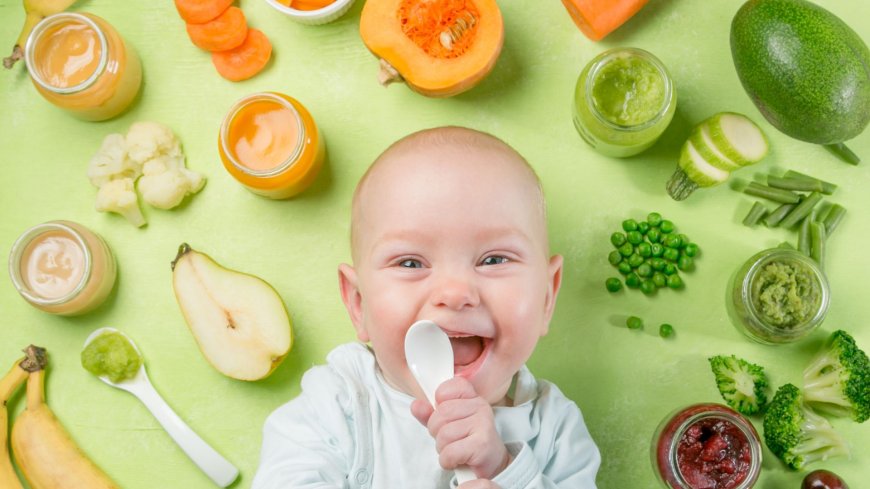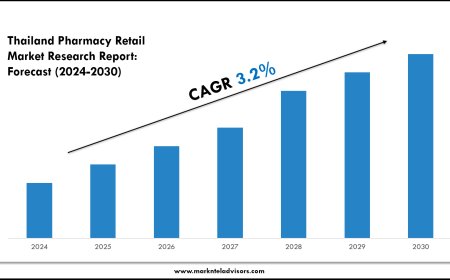Organic Baby Food Market to Surpass USD 13.86 Billion by 2033, Driven by Parental Shift Toward Healthier, Chemical-Free Nutrition
According to Renub Research, the Global Organic Baby Food Market is projected to grow from USD 5.67 Billion in 2024 to USD 13.86 Billion by 2033,

Request Free Sample Report
? https://www.renub.com/request-sample-page.php?gturl=organic-baby-food-market-p.php
Rising Demand for Safe and Organic Infant Nutrition Fuels Market Expansion
According to Renub Research, the Global Organic Baby Food Market is projected to grow from USD 5.67 Billion in 2024 to USD 13.86 Billion by 2033, expanding at a robust CAGR of 10.45% from 2025 to 2033. The surging demand stems from a fundamental shift in parental priorities, emphasizing safe, chemical-free, and nutritionally superior food options for infants and toddlers.
Increasing concerns over food safety, coupled with the desire for products free from pesticides, synthetic fertilizers, and artificial additives, are transforming the baby food segment. As awareness around organic certifications and clean-label practices grows, millennial and Gen Z parents are embracing organic baby food as the new norm for child nutrition.
Parents Opt for Organic as Awareness of Toxins and Allergens Grows
Modern parents are significantly more informed about the potential health hazards of synthetic ingredients, genetically modified organisms (GMOs), and chemical preservatives. As a result, many are actively seeking organic alternatives to ensure their babies receive clean, traceable, and sustainably sourced nutrition.
Growing research on the early-life impact of nutrition on immunity, development, and long-term health has further bolstered this shift. Organic baby foodsrich in vitamins, minerals, and antioxidantsare now viewed as essential for fostering cognitive development and digestive health in early life stages.
Clean Label Movement and Certified Ingredients Drive Consumer Trust
Transparency is a key pillar of consumer trust in the organic baby food market. Parents are increasingly checking product labels for organic certification logos, country of origin, and ingredient traceability. The clean label trend, which emphasizes minimal, recognizable, and responsibly sourced ingredients, has become a major driver for purchasing decisions.
Certifications such as USDA Organic, EU Organic, and Non-GMO Project Verified assure consumers that the products have undergone strict regulatory scrutiny. Organic baby food brands that maintain these high standards are gaining a competitive edge by aligning with values of safety, quality, and environmental responsibility.
E-commerce and Subscription-Based Models Redefine Accessibility
Digital commerce has revolutionized the way organic baby food is purchased. Busy parents now rely heavily on e-commerce platforms and subscription delivery models that offer flexible, personalized, and convenient access to a wide range of organic products.
Brands offering monthly food boxes, custom meal plans, and AI-driven nutrition suggestions are winning over tech-savvy parents. Moreover, online platforms provide detailed product information, customer reviews, and access to exclusive blends, making them an ideal channel for discovering and trying new organic baby food brands.
Innovation in Ingredients and Flavor Profiles Attract Health-Conscious Parents
To meet growing demand and diversify their offerings, companies are introducing innovative organic formulations featuring superfoods, ancient grains, probiotics, and allergen-free alternatives. Organic quinoa, chia seeds, kale, beetroot, coconut milk, and fortified lentils are finding their way into baby food jars, pouches, and snacks.
Brands are also experimenting with global flavor inspirations, such as turmeric-infused rice, Mediterranean herbs, or Japanese miso-blends, giving parents more culturally diverse options for their babies palates.
Asia-Pacific Emerging as a High-Potential Growth Region
North America and Europe Lead, But Asia-Pacific Catching Up
While North America and Europe remain dominant in terms of organic baby food consumption, Asia-Pacific is witnessing the fastest growth, driven by rising disposable incomes, urbanization, and shifting attitudes toward child nutrition in countries like China, India, and Indonesia.
Parents in these markets are increasingly turning to premium, imported organic baby food products, perceiving them as safer and healthier. As domestic manufacturers scale up and more regulatory frameworks are introduced, Asia-Pacific is set to become a major contributor to global organic baby food revenues.
Urbanization and Working Mothers Boost Demand for Convenient Organic Options
With more parents living fast-paced urban lifestyles, the demand for ready-to-eat, portable, and shelf-stable organic baby foods is increasing. The entry of squeeze pouches, bite-sized snacks, and pre-mixed cereals into the organic segment offers both convenience and nutritional balance.
Working mothers especially appreciate the time-saving benefits of organic baby food that doesnt compromise on safety or quality. This trend has led to increased innovation in packaging, portion control, and resealable containers, making organic products even more parent-friendly.
Major Companies Leading the Global Organic Baby Food Market
The competitive landscape is shaped by both multinational giants and emerging organic specialists. These companies are constantly upgrading their product portfolios with clean-label innovations, sustainable packaging, and tailored nutrition plans.
Key Players Include:
-
Nestl S.A. (Gerber Organic)
-
Danone S.A. (Happy Family Organics)
-
The Hain Celestial Group (Earth's Best)
-
Plum Organics
-
HiPP GmbH & Co. Vertrieb KG
-
The Kraft Heinz Company
-
Abbott Laboratories (Similac Organic)
-
Sprout Foods, Inc.
-
Else Nutrition
-
Little Spoon
These players are expanding their distribution through online channels, supermarket chains, and specialty organic stores, while also investing in eco-friendly packaging, plastic reduction, and carbon-neutral production facilities.
Sustainability and Ethical Sourcing: A Growing Priority
Todays parents are not just concerned about what goes into the babys body, but also how the product is made. As a result, sustainability in the form of recyclable packaging, organic farming practices, cruelty-free testing, and fair-trade sourcing is becoming a key purchase influencer.
Many brands are showcasing their commitment to eco-conscious operations, offering biodegradable packaging and working with local farmers and cooperatives to ensure fair trade and community empowerment.
Challenges in the Market: Pricing and Availability
Despite high demand, the organic baby food market faces challenges in terms of premium pricing, limited availability in rural areas, and complex certification processes. Many middle- and low-income families find organic baby food less affordable compared to conventional alternatives.
To address this, companies are exploring cost-effective production techniques, government subsidy partnerships, and smaller portion packs to increase affordability and reach a broader consumer base.
Future Outlook: Personalization and AI to Lead Next Wave of Growth
The future of organic baby food lies in personalized nutrition, powered by AI and data analytics. Apps that track a babys growth, preferences, allergies, and nutritional needs will soon recommend tailor-made organic food plans.
From DNA-based nutrition insights to gut microbiome optimization, companies are investing in the next generation of infant health science. As consumer expectations continue to rise, innovation, safety, sustainability, and personalization will define the future landscape of organic baby nutrition.
Request Free Sample Report
? https://www.renub.com/request-sample-page.php?gturl=organic-baby-food-market-p.php
New Publish Report:
- Europe Portable Washing Machine Market Analysis 2025
- Global Chillers Market Insights & Growth Forecast 20252033
- Global Vending Machine Market Automation Trends & Forecast 20252033
About the Company
Renub Research is a Market Research and Consulting Company with more than 15 years of experience, especially in international Business-to-Business Research, Surveys, and Consulting. We provide a wide range of business research solutions that help companies make better business decisions. We partner with clients across all sectors and regions to identify their highest-value opportunities, address their most critical challenges, and transform their businesses.
Our wide clientele includes key players in Healthcare, Travel & Tourism, Food & Beverages, Power & Energy, Information Technology, Telecom & Internet, Chemicals, Logistics & Automotive, Consumer Goods & Retail, Building & Construction, and Agriculture.
Our core team comprises experienced professionals with graduate, postgraduate, and Ph.D. qualifications in Finance, Marketing, Human Resources, Bio-Technology, Medicine, Information Technology, Environmental Science, and more.
Media Contact
Company Name: Renub Research
Contact Person: Rajat Gupta, Marketing Manager
Phone No: +91-120-421-9822 (IND) | +1-478-202-3244 (USA)
Email: rajat@renub.com
Website: https://www.renub.com






























